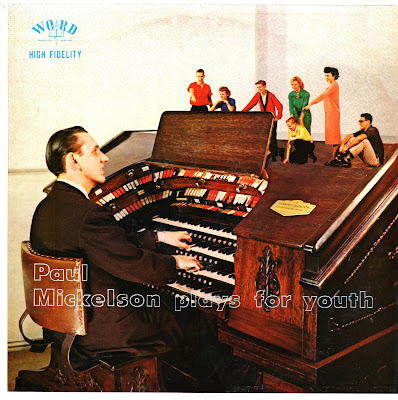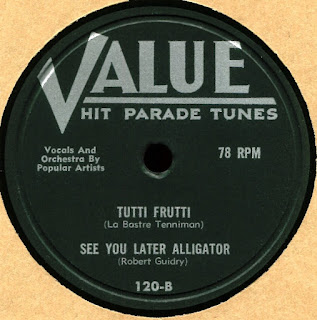You are here in search of early Neely Plumb. You may not even know who Neely was, yet you feel a need for early Neely. Well, you came to the right place. In the early 1950s, Neely was the bandleader (and possibly producer and music director) for the budget Music Masters and Ace-Hi labels, and he went on to a very successful career (and, I'm sure, a much higher salary) at RCA. I'd link to his AllMusic bio, but the page is festooned with ads. AllMusic reports that Neely worked with Jefferson Airplane, Esquivel, and Ann-Margret, and... arranged Sheb Wooley's
Purple People Eater. Now,
that's the important credit! The talented Neely died in 2000 at the age of 88.
Clearly, Plumb was gifted, so it's no surprise that the Music Masters selections are quite well done--and we'll be hearing seven of them. 78s and 45s on Music Masters and Ace-Hi tend to survive in chewed-up condition, so when I saw a mint-looking MM 78 on eBay, I knew I had to have it--especially since it contains one of my all-time pop favorites,
Hold Me,
Thrill Me,
Kiss Me. Kathryne Steele is the very fine vocalist on this track, and she gets to have her name spelled two different ways on the label--"Kathereyne" and "Kathryne"--and I could find no cyber-info at all on her (even using both spellings), outside of record-list data, though Discogs has this pic of her:
So we know she was talented and cute. Just one of the many good postwar vocalists trapped on budget labels, and all because, post-big band, there were good vocalists hanging from the rafters. Cool trivia about the original Coral label version of
Hold Me... by Karen Chandler--its flip,
One Dream (
Tells Me), was penned by one "Jerry Stevens," an alias for Joseph Stefano, who wrote the amazing screenplay for Alfred Hitchcock's
Psycho and who produced the famous first season of
The Outer Limits. Now you know.
See You Later Alligator is a blog repeat, but this file came out a lot better than before. Its flip (on Value Hit Parade Tunes, part of the Broadway label group) is a cover of a cover. Namely, a fake version of Pat Boone's hit version of Little Richard's
Tutti Frutti. Now, I cannot begin to explain why on earth LR (Richard Wayne Penniman) was composer-credited on this label as "La Bastre Tenniman"--I can just report that "bastre" is French for "with clothes." This could refer to LR's flamboyant garb, but what the heck?? This version is pretty lively--moreso than Boone's. And I like Boone, by the way, even if his rock and roll doesn't pass the authenticity test.
Drinkin' Wine... is making a repeat appearance, too, and I think this file improves on my previous effort. Hard to say, as the 78 is pretty beat. It's been stolen from my blog at least twice--I know my rip, because I've memorized the surface noise! So we have the Texas Playboys (not Bob Wills') playing an uptempo country cover of an R&B hit, and, would you believe, the result sounds like an uptempo country cover of an R&B hit. But... but... we have all these journalists telling us r&r came from the Grand Ole Opry, and this hardly sound like r&r. Now I'm all confused. Anyway, this side does jump along, though the steel guitar sounds like a badly sampled bagpipe, while the background singers are pretty terrible. And it's amusing to hear a C&W voice intone, "Aw, give me some of that slop." Maybe we should rethink this rock-came-from-country stuff. But I love this side, and I found a page which
talks about the Western Magic label and its owner, Jimmy Mercer of Paris, Texas.
Neely Plumb's
Dragnet is a cover of Ray Anthony, and the recording is very unbalanced, with tinny highs and booming bass. Oh, well. You get what you don't pay for, I guess. The same label's
Oop-Shoop cover sounds better, and I don't know the history of this song--as in, who did the pop cover. Prior to 1955-56, budget label fakes tended to copy the pop-hit versions of black numbers, so.... I'll need to do some serious
Oop Shoop research, and I've always longed to type that. Dunno if there's a hyphen or not.
The fake of
Dim,
Dim the Lights, a big hit for Bill Haley in its genuine form, is credited to Lee Evans and the Melodians on Music Masters, while the same track is credited to one Bob Le Mont on Gateway Top Tune. The real singer, of course, is La Bastre Tenniman. No, seriously, who knows? The fake
Heartbreak Hotel, performed by the well-known group, "Famous Western Stars with Full Orchestra," comes to us courtesy of Variety Records, and it could have been a lot better. It's not the famous George Jones version issued under aliases on Starday and Tops, though it almost sounds like a copy thereof. Discogs offers this info on Variety: "US label." From the same 78,
Be-Bop-a-Lula, which has less muffled fidelity and a slightly less bad singer, though he seems to think the song is called
Be-Bob-a-Lula. Fairly neat electric guitar break.
From the ultra-ultra-cheap Poplar Extended Play Records (Record-o-Mail), we have a killer version of
Shake,
Rattle and Roll, which out-rocks the Bill Haley cover (which I think this is a fake of), and a weird
That's All Right, which is likely copying the Marty Robbins, not the Elvis, version. Also, the fine
Rock Around the House fake which was credited to Gabe Drake on Promenade and Fred Gibson on Tops, and a rocking
House of Blue Lights (slang for a brothel, I believe) which sounds like the fake version issued by Rite Records. Then, more Big 4 Hits (Rite Records), a couple Top Hit Tunes (Waldorf), and a Varisty (Eli Oberstein). The Varsity is a blog repeat--1949's
I've Got a Lovely Bunch of Cocoanuts--which I can only presume copies the Merv Griffin mega-hit, and
Syncopated Clock on Royale (Elliot Everett is an alias for Oberstein), which is another repeat. Both were ripped using my 3.0 mil stylus this time, instead of the 3.5.
The Reps'
Reveille Rock comes from the only 78 rpm Hit Parader Records edition I've ever come across, and the Capital Distributing Company of Derby, Conn. also gave us Charlton Comics, in whose pages the Hit Parader and Song Hits fakes were offered by mail at a low, low price. Which was the only price Capital Distribution could have hoped for.
Hopefully, I've caught all the typos. If not, well... I'm only android. I mean, human. Enjoy!
DOWNLOAD--Music Masters, more
Why Don't You Believe Me (Douglas-Roddy-Laney)--Katheryne (sic) Steele, Neely Plumb's Orch. (Music Masters 2004)
Hold Me, Thrill Me, Kiss Me (Noble)--Kathryne Steele, Neely Plumb's Orch.
Lady of Spain (Reaves-Evans)--Bobby Doyle, Neely Plumb's Orch. (Same)
Trying (Vaughan)--Mark McLean, Neely Plumb's Orch. w. The Lee Gordon Group (Same)
See You Later Alligator (Robert Guidry)--No artist credit (Value Hit Parade Tunes 120)
Tutti Frutti (La Bastre Tenniman)--Same
Drinkin' Wine Spo-De-O-De (McGhee)--Western Playboys, Vocal by Les Guthrie (Western Magic Hit Parade Tunes 1203)
Dragnet (Schumann)--Neely Plumb and His Orch. (Music Masters 2011)
Oop-Shoop--Peggy Lawrence w. Neely Plumb and His Orch. (Music Masters 2020)
Dim, Dim the Lights (I Want Some Atmosphere) (Ross-Dixon)--Lee Evans and the Melodians (Music Masters 2023)
Heartbreak Hotel--Famous Western Stars with Full Orchestra (Variety Records Country and Western Hits V-1802-6)
Be-Bop-A-Lula--Same, except V-1802-5
Shake, Rattle and Roll--Stars of Radio, TV, Stage and Screen (Popular Extended Play Records PO-2209)
Rock Around the Clock--No artist credit (Popular Extended Play Records PO-8)
The House of Blues Lights--Same
This Old House (Hamblen)--Tommy Loftin and His Mountain Boys (Broadway 281; 1954)
Reveille Rock--The Reps (Hit Parader Records BR-100)
Syncopated Clock (Anderson)--Elliot Everett and His Orch. (Royale 322)
That's All Right--No artist credit (Western Extended Play Records HB-8)
I Beg of You--Jimmy Lane (Top Hit Tunes TH-1801; Waldorf Record Corp.)
Waitin' in School--Same
Mr. Sandman--The Four Queens (Big 4 Hits 113; 1954)
Oop Shoop--The Four Jacks (Big 4 Hits 111; 1954)
I've Got a Lovely Bunch of Cocoanuts (Heatherton)--Jimmy Livingston and His Orch., v: "Skeets" Morris and Chorus (Varsity 233; 1949)
Lee













































